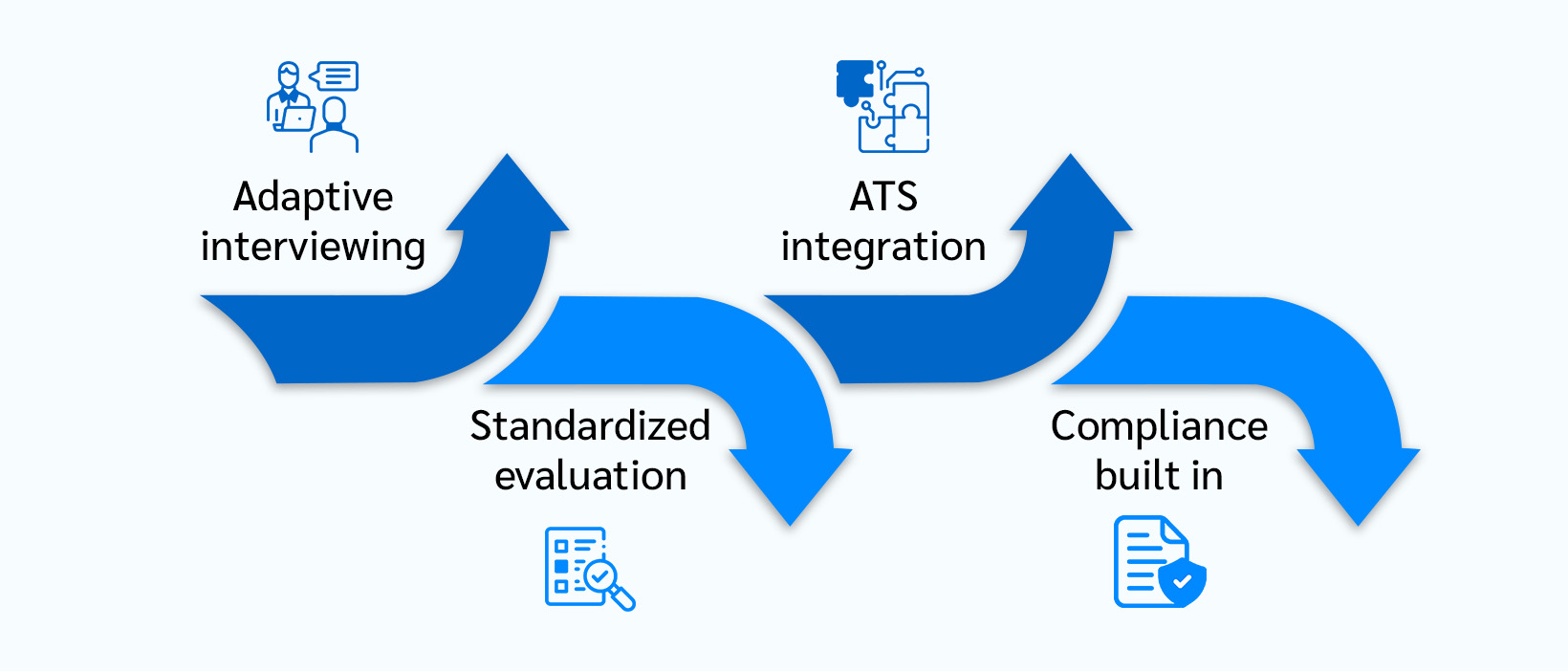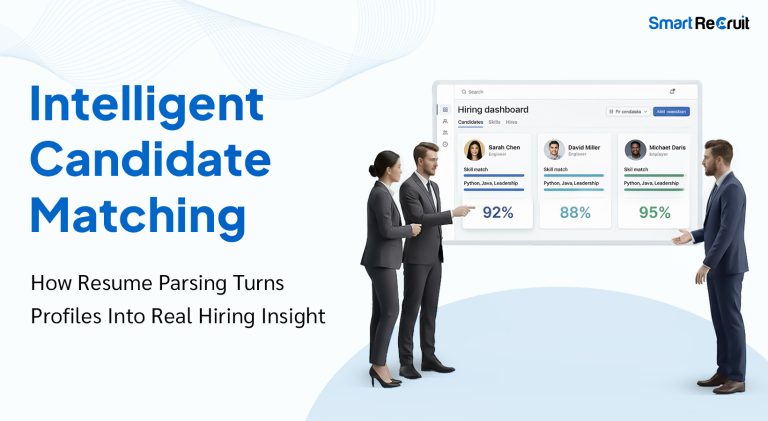Aspira: Turn First Interviews Into a Hiring Advantage
This is where Aspira changes the equation.

Hiring speed and quality often pull in opposite directions. Move too quickly and you risk mis-hires. Move too slowly and top candidates drop out or accept competing offers. For years, hiring teams have tried to balance these pressures by improving sourcing, refining assessments, or accelerating offer stages. Yet the most powerful lever is hiding in plain sight: the first interview.
That single step shapes everything that follows. Offer rates, acceptance rates, time to hire, and even early retention all depend on how this initial conversation is managed. A strong candidate might apply on Monday but wait a week to speak with someone because recruiters or subject-matter experts are double-booked. By the time the interview happens, that candidate may already be gone.
This is where Aspira changes the equation.
Aspira is an AI interview automation engine that conducts structured, adaptive first-round interviews. It applies consistent, competency-based scoring, integrates directly with major applicant tracking systems, and generates auditable, timestamped reports for compliance. The result is a first interview that is consistent, available on demand, and measurable. Hiring teams gain both speed and accuracy, while human judgment remains central where it truly matters.
When organizations start treating the first interview as a strategic point of leverage instead of a scheduling task, the entire hiring process begins to move with greater pace, consistency, and confidence.
Why the First Interview Matters More Than You Think
At first glance, the first interview may seem like a simple screening step. In reality, it carries far more influence over hiring outcomes than most teams realize.
A 2022 working paper by Brian Jabarian published on SSRN, tracked more than 70,000 applicants across multiple industries and role types. Candidates were randomly assigned to either a traditional panel interview or a structured, adaptive, AI-led interview powered by AI in recruitment. The differences were significant:
- 12% more job offers were made to candidates who went through AI-led interviews.
- 18% more hires were ultimately made from that group.
- 17% higher 30-day retention was recorded compared to traditionally interviewed candidates.
Even more telling, when applicants were given the choice between speaking with a human panel or the AI interviewer, 78% chose the AI. Recruiters, independently, rated those candidates more favorably on average.
This isn’t just a statistical curiosity. It’s a signal that when interviews are structured, adaptive, and available on demand, hiring pipelines behave differently: Offer rates rise, retention improves, and the entire funnel moves faster.
Where Hiring Momentum Quietly Slows Down
Most hiring teams do not lose momentum at the sourcing stage. They lose it at the first interview.
The first slowdown usually comes from scheduling. Early interviews depend on the availability of recruiters and subject matter experts. A qualified candidate might express interest on Monday but wait a full week to speak with someone. That delay increases the risk of disengagement or competing offers.
The second slowdown is inconsistent evaluation. Different interviewers use different standards, ask different questions, and interpret responses differently. Two equally capable candidates can receive very different feedback simply because they spoke to different people.
The final slowdown is resource strain. Highly skilled SMEs spend hours every week conducting exploratory interviews that rarely move forward. That time is valuable, and in high-growth or compliance-driven organizations, it becomes a significant bottleneck.
Individually, these issues may seem minor. Together, they slow the entire hiring funnel. What begins as a small scheduling delay or inconsistent score often leads to longer hiring cycles, higher costs, and a weaker candidate experience..
The Shift Toward Structured, AI-Led Interviews

To address these friction points, many hiring teams are adopting structured, AI-led interviews for the first round. These systems conduct adaptive, competency-based conversations, evaluate responses using standardized frameworks, and deliver consistent scoring data automatically.
Smart Recruit’s Aspira demonstrates what this looks like in practice:
- Adaptive interviewing: Aspira uses branching logic and real-time analysis to adjust follow-up questions and depth, creating a conversation that feels more like a skilled interviewer than a static questionnaire.
- Standardized evaluation: Every candidate is assessed against the same competency framework. Responses are scored using defined criteria, which reduces inconsistency and unintended bias.
- ATS integration: Aspira connects directly with leading ATS platforms such as Workday and SuccessFactors, allowing recruiters to access results instantly without moving data between systems.
- Compliance built in: Timestamped logs, secure proctoring, and behavioral monitoring support the compliance needs of sectors such as BFSI and healthcare while meeting global hiring standards.
This approach reflects how AI in recruitment is reshaping early-stage evaluation. The goal is not to replace human judgment but to structure and accelerate the stages of the process that do not require limited human capacity.
What the Numbers Say
Across industries, structured AI-led interviews consistently produce measurable improvements:
- A 70,000+ applicant field study showed higher offer rates, more hires, and better retention.
- Sullivan, et al. (2020): According to a paper cited in The Impact of the AI on Recruitment Process, companies using AI experienced around a 50 percent reduction.
- Case studies published in IJBMI (2023) report organizations cutting recruitment time by up to 85% and reducing costs by roughly 30% after automating early interviews.
These results are not outliers. When AI in recruitment enables early interviews to become structured, adaptive, and available on demand, pipeline throughput increases, costs drop, and candidate experience improves.
Rolling Out AI Interviews Effectively
Technology alone does not guarantee success. The way AI in recruitment is introduced and managed matters just as much as the tool itself.
- Transparent communication
Candidates should understand how the AI works, what data it collects, and how it evaluates responses. Clarity builds trust. - Structured feedback
Competency-based feedback helps candidates understand their performance and strengthens employer brand perception. - Auditability
Compliance and DEI teams should have access to logs, scoring logic, and fairness metrics. Transparency builds confidence internally. - Bias monitoring
Teams should regularly review results across demographics and retrain models when needed. This turns AI into a tool for fairness, not just speed.
When handled properly, candidates often prefer structured AI interviews. They can complete them at their convenience, receive faster feedback, and experience more consistency.
Strategic Impact Across the Funnel
Structured AI-led interviews do more than speed up one stage. They influence several dimensions of hiring performance:

For high-volume or compliance-driven roles, these shifts can be transformative. For niche or senior positions, AI-led interviews often work best as a structured complement to human judgment.
From Data to Reality: What This Could Mean for Teams
The numbers tell only part of the story. The rest is what happens inside hiring teams when the first interview stops acting as a bottleneck.
Recruiters spend less time coordinating calendars and more time engaging qualified candidates. Subject matter experts are no longer tied up in repetitive early-stage calls. Candidates, instead of waiting a week for their first interview, can complete it at a time that suits them and feel that the process respects their time.
That single change reshapes the rhythm of hiring. Conversations begin sooner, pipelines move more smoothly, and feedback loops tighten. Hiring teams start operating with a level of momentum that is hard to achieve when scheduling and evaluation depend entirely on people’s availability.
This is the purpose of Aspira. It is not only about faster interviews but about restoring momentum, fairness, and focus to a stage that has quietly slowed teams down for years.
Shaping Hiring Strategy Around Leverage Points
The first interview is becoming a controllable, data-rich stage that determines the pace and quality of everything that follows.
When this part of the process is structured and adaptive through AI in recruitment, hiring becomes easier to measure, forecast, and improve. Recruiters gain visibility into early performance. Leaders gain confidence in decision consistency. Candidates experience a smoother, faster process.
Teams that treat the first interview as a strategic lever build more predictable pipelines, reduce bias, and turn hiring into a measurable business process rather than a logistical challenge.
What This Really Means for Hiring Teams
When the first interview no longer acts as a bottleneck, every stage of the hiring process improves. Recruiters spend less time coordinating calendars and more time engaging strong candidates. Subject-matter experts regain valuable hours each week. Candidates benefit from the flexibility to complete interviews at a time that suits them, which leads to stronger engagement and a more positive experience.
This shift restores momentum to hiring. Conversations begin sooner, pipelines move more efficiently, and decisions are made with greater consistency. What seems like a small operational improvement often creates a measurable competitive advantage.
Aspira is not designed to replace human input. It exists to help hiring teams regain control of their process. When every candidate receives a structured, fair, and on-demand first interview powered by AI in recruitment, the organization builds speed without sacrificing quality.
If your candidates are still waiting days for their first interview, your hiring process is already behind.
Aspira helps close that gap with structure, transparency, and speed from the very first step.
See how Aspira can turn your first interviews into your hiring advantage. Contact us to start the conversation.
FAQs:
- How is AI changing interviews?
AI in recruitment is transforming interviews by using AI interview automation and interview scheduling automation to remove delays. AI hiring tools automatically match availability for both candidates and recruiters, conduct structured interviews, and deliver consistent competency-based evaluation. This creates a faster hiring process while improving candidate experience and decision accuracy.
- How does AI interview automation improve hiring speed and quality?
AI interview automation streamlines automated first interviews through consistent, structured conversations. It eliminates scheduling delays with interview scheduling automation, applies competency-based evaluation, and uses ATS integration to deliver a faster hiring process without losing quality or fairness
- What makes AI-led interviews better than traditional interviews?
AI-led interviews use adaptive questioning and structured interviews that assess every candidate using clear criteria. This approach reduces bias, improves accuracy, and supports smarter AI in recruitment decisions by giving hiring teams measurable data instead of opinions.
- How does structured interviewing reduce hiring bias?
Structured interviews guided by AI in recruitment use standardized questions and competency-based evaluation. This ensures each candidate is judged on the same metrics, minimizing human bias and supporting diversity and compliance goals in hiring automation.
- Is AI interview automation suitable for all roles?
AI interview automation works best for high-volume roles where speed and consistency matter. It complements human judgment by handling automated first interviews, ensuring a faster hiring process while maintaining fairness and structured insights through AI-led interviews.
Related Posts
Discover other posts that deepen your understanding of smart hiring, from AI-led interviews to streamlined candidate management techniques.
-
What to Look for in a Recruitment Platform That Actually Works
Hiring today demands automation, fairness, and full visibility.
-
Intelligent Candidate Matching:
How Resume Parsing Turns Profiles Into Real Hiring Insight
-
Why Industries Need Smart Recruit: AI-Powered Hiring Without the Guesswork
Why Industries Need Smart Recruit: AI-Powered Hiring Without the Guesswork



